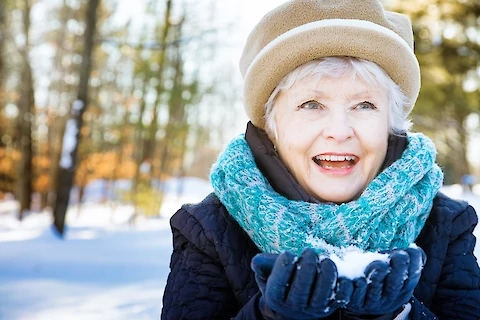
Winter is a time for warm fires, hot cocoa, and snowy landscapes. For seniors, however, it also brings a set of unique safety challenges. As temperatures drop and snow accumulates, risks such as icy sidewalks, cold weather exposure, and heating issues become imminent. That's why it's important for seniors to adequately prepare to ensure their safety at home during this season.
Read on for some proactive and actionable strategies to mitigate these risks, ensuring seniors can enjoy the winter season comfortably and safely.
Potential Winter Hazards for Seniors
It's vital to recognize the specific hazards winter can bring, particularly for seniors. Icy sidewalks are a common issue, often leading to slips and falls. Cold weather exposure, meanwhile, can lead to hypothermia if seniors aren't adequately protected. Lastly, heating and insulation issues in the home can make it challenging to maintain a comfortable temperature indoors. These hazards can heavily impact seniors, making winter safety particularly important.
A Checklist for Winter Preparations
Now, let's tackle these hazards one by one. While the process might seem to be a lot to handle, they're actually quite simple—especially when there's a helping hand.
1. Clear Walkways
Dealing with icy sidewalks is a two-fold process. Regular maintenance and cleaning can keep the pathways clear of snow, reducing the risk of ice formation. Use ice-melting products available in the market as an additional precaution—just choose a pet-friendly type that doesn't damage concrete.
2. Dress Appropriately
When it comes to preventing cold weather exposure, dressing appropriately is a must. Encourage seniors to layer their clothing and cover their extremities when going outside. However, when temperatures drop to extreme lows, staying indoors is the safest option.
3. Reduce Heat Loss
Avoid heating and insulation issues with regular inspection and maintenance of heating systems. Hiring a professional to check your heating unit before winter sets in can save seniors from unexpected breakdowns and the dangers of an unheated home. Ensuring the house is adequately insulated can conserve heat and lower energy bills.
4. Check or Install Smoke and Carbon Monoxide Alarms
Smoke alarms and carbon monoxide detectors are critical safety features in any home, but they're particularly essential during the winter when the use of heaters, fireplaces, and candles increases. Regularly checking and replacing batteries can prevent potential fires. Even better, have the units hard-wired into the home.
Additional Winter Safety Tips
Beyond our checklist, a few additional tips can help seniors stay safe and healthy this winter.
- Keep up with regular physical activity—a doctor-approved exercise regimen can boost overall health and immunity, keeping winter ailments at bay.
- Ensure the pantry is well-stocked. This can minimize the need for grocery runs during severe weather.
- Schedule regular health check-ups to monitor any changes in health during the colder months.
- Make sure vehicles are properly maintained with the appropriate tires for the season.
- Put a stash of snacks and warm blankets in vehicles in case of road closures or breakdowns.
- Keep important numbers by the phone to make it easier to reach out if help is required.
Stay Safe With Senior Helpers
Winter safety for seniors goes beyond dressing warmly and avoiding icy sidewalks. It involves proactive steps to prepare the home, maintain health, and keep emergency measures in place. With the right precautions, seniors can enjoy the winter season safely and comfortably.
If you or a loved one in Minneapolis, Osseo, Excelsior, Mound, or Chaska might benefit from drop-in wellness checks and companionship, contact us at Senior Helpers Lake Minnetonka and Surrounding Areas. Our professionals can assist with anything from light housework and meal preparation to medication management and personal care. We look forward to telling you more about how we can give seniors like you peace of mind and enhance your independence.